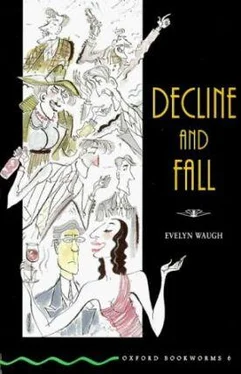'I'm afraid not, said Paul. 'Have they given you an interesting library book?
'Lady Almina's Secret, said the lion of the Lord's elect. 'Pretty soft stuff, old‑fashioned, too. But I keep reading the Bible. There's a lot of killing in that.
'Dear me, you seem to think about killing a great deal.
'I do. It's my mission, you see, said the big man simply.
* * *
Sir Wilfred Lucas-Dockery felt very much like Solomon at ten o'clock every morning of the week except Sunday. It was then that he sat in judgement upon the cases of misconduct among the prisoners that were brought to his notice. From his chair Colonel MacAdder had delivered sentence in undeviating accordance with the spirit and the letter of the Standing Orders Concerning the Government of Her Majesty's Prisons, dispensing automatic justice like a slot machine; in went the offence; out came the punishment. Not so Wilfred Lucas‑Dockery. Never, he felt, was his mind more alert or resourceful or his vast accumulation of knowledge more available than at his little court of summary justice. 'No one knows what to expect, complained warders and prisoners alike.
'Justice, said Sir Wilfred, 'is the capacity for regarding each case as an entirely new problem. After a few months of his administration, Sir Wilfred was able to point with some pride to a marked diminution in the number of cases brought before him.
One morning, soon after Paul began on his special régime of reclamation, his companion was called up before the Governor.
'God bless my soul! said Sir Wilfred; 'that's the man I put on special treatment. What is he here for?
'I was on night duty last night between the hours of 8 p.m. and 4 a.m., testified the warder in a sing‑song voice, 'when my attention was attracted by sounds of agitation coming from the prisoner's cell. Upon going to the observation hole I observed the prisoner pacing up and down his cell in a state of high excitement. In one hand he held his Bible, and in the other a piece of wood which he had broken from his stool. His eyes were staring; he was breathing heavily, and at times muttering verses of the Bible. I remonstrated with the prisoner when he addressed me in terms prejudicial to good discipline.
'What are the words complained of? asked the Chief Warder.
'He called me a Moabite, an abomination of Moab, a wash‑pot, an unclean thing, an uncircumcised Moabite, an idolater, and a whore of Babylon, sir.
'I see. What do you advise, officer?
'A clear case of insubordination, sir, said the Chief Warder. 'Try him on No. 1 diet for a bit.
But when he asked the Chief Warder's opinion, Sir Wilfred was not really seeking advice. He liked to emphasize in his own mind, and perhaps that of the prisoner's, the difference between the official view and his own. 'What would you say was the most significant part of the evidence? he asked.
The Chief Warder considered. 'I think whore of Babylon, on the whole, sir.
Sir Wilfred smiled as a conjurer may who has forced the right card.
'Now I, he said, 'am of different opinion. It may surprise you, but I should say that the significant thing about this case was the fact that the prisoner held a piece of the stool.
'Destruction of prison property, said the Chief Warder. 'Yes, that's pretty bad.
'Now what was your profession before conviction? asked the Governor, turning to the prisoner.
'Carpenter, sir.
'I knew it, said the Governor triumphantly. 'We have another case of the frustrated creative urge. Now listen, my man. It is very wrong of you to insult the officer, who is clearly none of the things you mentioned. He symbolizes the just disapproval of society and is, like all the prison staff, a member of the Church of England. But I understand your difficulty. You have been used to creative craftsmanship, have you not, and you find prison life deprives you of the means of self‑expression, and your energies find vent in these foolish outbursts? I will see to it that a bench and a set of carpenter's tools are provided for you. The first thing you shall do is to mend the piece of furniture you so wantonly destroyed. After that we will find other work for you in your old trade. You may go. Get to the cause of the trouble, Sir Wilfred added when the prisoner was led away; 'your Standing Orders may repress the symptoms; they do not probe to the underlying cause.
* * *
Two days later the prison was in a state of intense excitement. Something had happened. Paul woke as the bell rang at the usual time, but it was nearly half an hour before the doors were unlocked. He heard the warder's 'Slops outside! getting nearer and nearer, interjected with an occasional 'Don't ask questions, 'Mind your own business, or a sinister 'You'll know soon enough, in reply to the prisoner's questions. They, too, had sensed something unusual. Perhaps it was an outbreak of some disease ‑ spotted fever, Paul thought, or a national disaster in the world outside ‑ a war or revolution. In their enforced silence the nerves of all the men were tightened to an acuteness of perception. Paul read wholesale massacres in the warder's face.
'Anything wrong? he asked.
'I should bleeding well say there was, said the warder, 'and the next man as asks me a question is going to cop it hot.
Paul began scrubbing out his cell. Dissatisfied curiosity contended in his thoughts with irritation at this interruption of routine. Two warders passed his door talking.
'I don't say I'm not sorry for the poor bird. All I says is, it was time the Governor had a lesson.
'It might have been one of us, said the other warder in a hushed voice.
Breakfast arrived. As the hand appeared at his door Paul whispered: 'What's happened?
'Why, ain't you 'eard? There's been a murder, shocking bloodthirsty.
'Get on there, roared the warder in charge of the landing.
So the Governor had been murdered, thought Paul; he had been a rnischievous old bore. Still, it was very disturbing, for the news of a murder which was barely noticed in the gay world of trams and tubes and boxing-matches caused an electric terror in this community of silent men. The interval between breakfast and chapel seemed interminable. At last the bell went. The doors were opened again. They marched in silence to the chapel. As it happened, Philbrick was in the next seat to Paul. The warders sat on raised seats, watchful for any attempt at conversation. The hymn was the recognized time for the exchange of gossip. Paul waited for it impatiently. Clearly it was not the Governor who had been murdered. He stood on the chancel steps, Prayerbook in hand. Mr Prendergast was nowhere to be seen. The Governor conducted the service. The Medical Officer read the lessons, stumbling heavily over the longer words. Where was Mr Prendergast?
At last the hymn was announced. The organ struck up, played with great feeling by a prisoner who until his conviction had been assistant organist at a Welsh cathedral. All over the chapel the men filled their chests for a burst of conversation.
'O God, our help in ages past, sang Paul.
'Where's Prendergast to‑day?
'What, ain't you 'eard? 'e's been done in.
'And our eternal home.
'Old Prendy went to see a chap
What said he'd seen a ghost;
Well, he was dippy, and he'd got
A mallet and a saw.
'Who let the madman have the things?
'The Governor; who d'you think?
He asked to be a carpenter,
He sawed off Prendy's head.
'A pal of mine what lives next door,
'E 'eard it 'appening;
The warder must 'ave 'eard it too,
'E didn't interfere.
'Time, like an ever‑rolling stream,
Bears all its sons away.
'Poor Prendy 'ollered fit to kill
For nearly 'alf an hour.
Читать дальше












